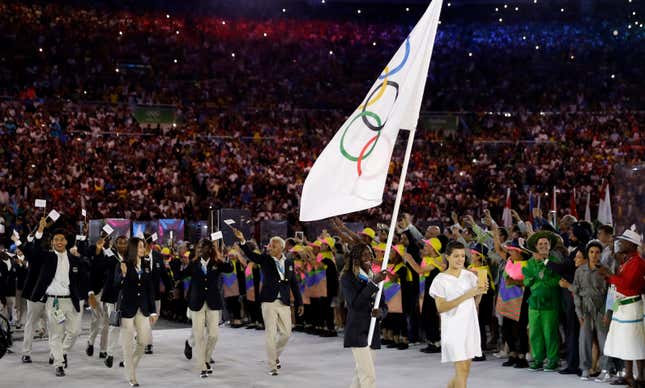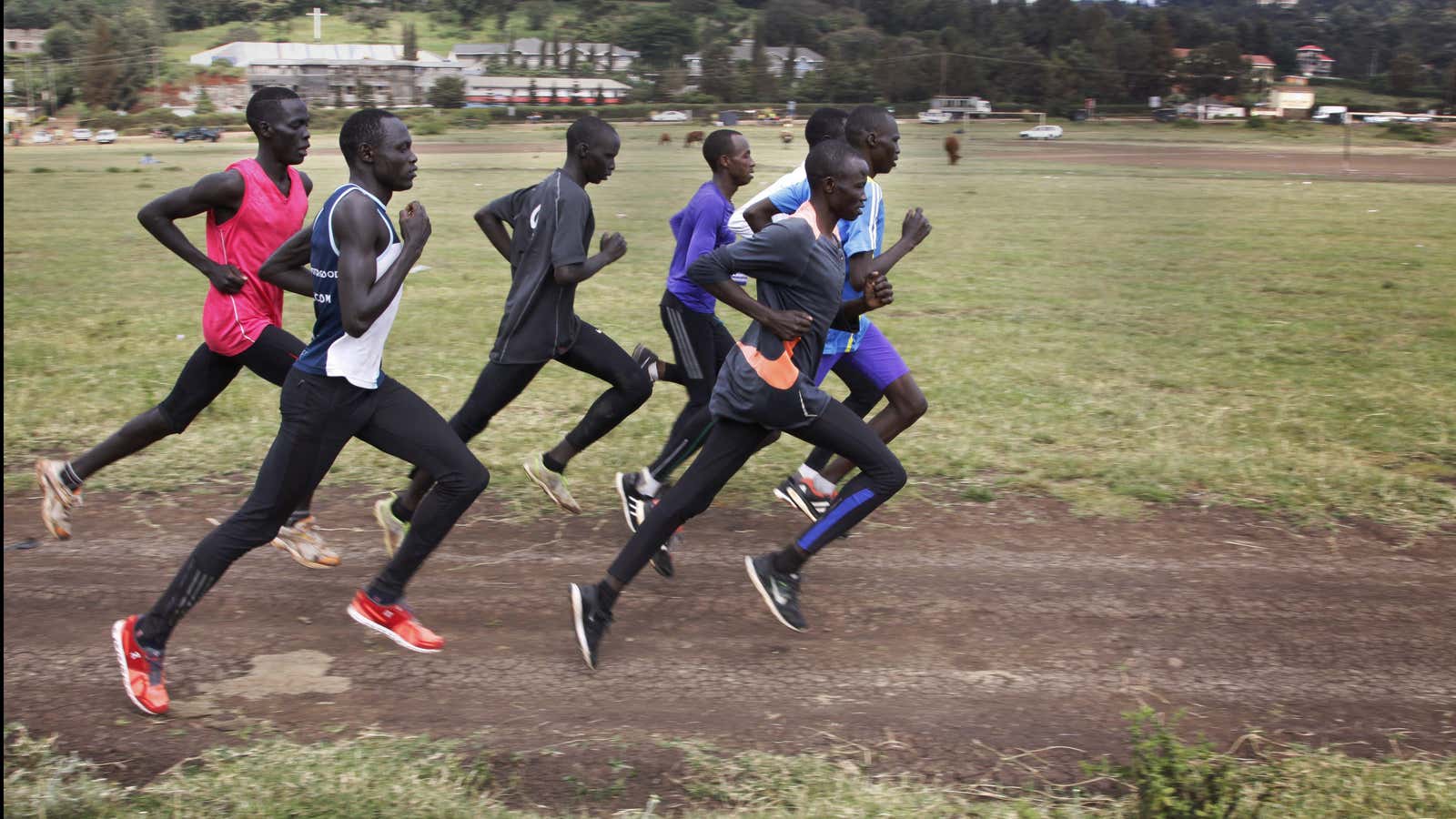Sixty-five athletes will compete in the women’s 800m race at the Rio Olympic Games. While many spectators will remain fixated on the champions, the residents of one of the world’s oldest refugee camp are staying up late to cheer on the world’s most unlikely medal contenders—the refugee Olympic team.
Of the entire team of 10, who between them fled conflicts in the Middle East and Africa, more than half are competing as runners. And four of the six come from the Kakuma refugee camp in Kenya. This includes 23-year-old Rose Nathike Lokonyen, who once ran shoeless—but got to wave the Olympic flag for refugees across the world during the opening ceremony.
The Kakuma refugee camp was first set up in 1991 following the outbreak of war in South Sudan and is now home to some 185,000 people. Residents, who aren’t allowed to build permanent structures, can only wait. The likelihood of a long-lasting peace in the country the fled look slim and the chances of being resettled are even slimmer.
The Olympic athletes Lokonyen, Yiech Pur Biel, Anjelina Nadai Lohalith, Paulo Amotun Lokoro, and James Nyang Chiengjiek all call this shantytown home. Their journey began in 2014, when Tegla Larpoupe (paywall), the first African woman to win the New York City marathon and a world record holder in several long-distance competitions, visited the camp on World Refugee Day.
While organizing fun sporting competitions among refugees, she was taken back by the amount of talent she saw in the camp. So when Larpoupe asked just over 20 residents to come train with her in the Ngong Hills, just outside Nairobi, many didn’t have to think twice about the answer. The refugees, who had all run away from devastating conflict, could now use their legs to build a future.
“There’s huge enthusiasm for running,” Duke Mwancha, a spokesperson for UNHCR Kenya, tells Quartz. Residents often host and take part in spontaneous athletics competitions to pass the time, Mwancha explains. Part of the reason is that you can do it anywhere, anytime, with no equipment.
Look at the some of the other Olympic events. Athletes looking to compete in cycling need to spend at least $19,000 on an bike. A horse for the equestrian events can cost $60,000 (paywall). But for the Kakuma refugees, they only needed a pair of donated shoes and a great deal of dedication.
Even the favorite for the women’s 800m is South Africa’s Caster Semenya, who grew up in a tiny village in the Limpopo province. Other rivals also come from humble backgrounds; there’s a part-time substitute teacher, a personal trainer, and a national hero who was selected to train for an elite academy as a child despite being malnourished. Long-distance running in general is dominated by athletes from poorer East Africa—perhaps even from three specific regions.
“The economic barriers to running are probably lower than any other sport,” says Amby Burfoot, winner of the 1968 Boston Marathon and editor of Runner’s World. “You don’t need expensive equipment, a training ground, or even a huge diet.” Roger Robinson, who set masters marathon records at Boston and New York and is the sport’s leading historian, also tells Quartz: “All you need is to get out of the door. Running is hugely accessible in that way.”
No money, no problem
The refugee athletes would get up at 6am, Monday to Saturday, to complete a mixture of road and track running, which many found challenging. “They had the passion, but didn’t know how to train,” camp training manager Jackson Pkemoi tells Quartz by phone. But the group quickly picked up the rigorous training schedule and soon started to thrive.

While watching these refugee athletes train, Larpoupe thought of entering them to the Olympics, an idea that at first seemed preposterous. Athletes who become refugees are usually stuck in an unfair limbo. They can’t compete for the country they’ve fled, but have yet to secure citizenship elsewhere.
But Larpoupe’s idea soon become a reality and within just one year, the athletes who were selected to train at her center were off to compete in the world’s greatest sporting event. While Pkemoi is under no illusion that the refugee athletes he trained will win gold medals, he found himself overcome with emotion when they set of to Rio.
“I can’t explain how proud I am,” Pkemoi says. “I trained them for a year and they are carrying a flag for refugees everywhere at the Olympics.”
But his work doesn’t stop here. Pkemoi is working with at least 24 refugee athletes and he has his eyes set on the 2017 World Championships in London and the 2020 Olympic Games in Tokyo. “If we continue training as hard we are, I’m sure we’ll get Olympic champions from these group of refugees,” he says.
